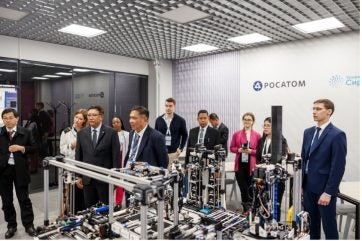
Rosatom has begun retraining nuclear specialists for its planned two-component nuclear energy programme (DvukhKomponentnoi Yadernoi Energetiki – DKYaE) and to work with generation IV reactors. According to the Rosatom Technical Academy, the new training course had been developed over more than a year and a half in collaboration with key experts of the Proryv (Breakthrough) project with the support of Rosatom’s Department of Scientific & Technical Programmes.
The Breakthrough project provides for the creation of a new technological platform for the nuclear industry based on a closed nuclear fuel cycle using fast neutron reactors. Initially this will involve recycling fuel from VVER reactors for use in fast reactors DKYaE). Ultimately fast reactors will be able to recycle used fuel repeatedly and will also be able to burn minor actinides as fuel, dramatically reducing nuclear waste.
A pilot demonstration power complex (ODEK – Opitno Demonstratsionovo Energo-Kompleks) is being built at the Siberian Chemical Combine in Seversk as part of the Breakthrough project to demonstrate closed fuel cycle technology. It is based on the Brest-OD-300 lead-cooled fast reactor supported by a module (MFR) for fabrication and refabrication of high-density uranium-plutonium nitride (SNUP) nuclear fuel and a module for reprocessing irradiated fuel. The reactor is scheduled for grid connection in 2027; the MFR is almost completed and planned for commissioning this year; construction of the reprocessing unit is planned for 2025-2026 for commissioning in 2030.
To provide staffing for the new nuclear technology platform, a series of training programmes are being held in 2024. The first courses are devoted to the basic principles of the DKYaE and acquaintance with the BREST-OD-300. The students are employees of leading organisations of the Russian nuclear industry, which are directly involved in the implementation of various aspects of the Breakthrough project.
According to Dmitry Evlanov, Director General of Breakthrough JSC, it would be a big omission, to develop new technologies, without thinking about how to implement them and who will implement them. The long-term programme for the development of the human resources potential for the new nuclear energy programme includes both the retraining of employees already working in the nuclear industry, and training young highly qualified specialists in Rosatom reference universities.
“For our part, we are developing a system for quickly involving new specialists in solving specific project problems and creating the conditions under which they will want to stay in the project for a long time,” he added.
This year courses planned the Rosatom Technical Academy include Equipment and systems of the turbine department BREST-OD-300 and Technology for the production of SNUP fuel. The courses are designed to form a basic understanding of the full deployment of the closed nuclear fuel cycle and the commissioning of innovative generation IV nuclear power reactors.






